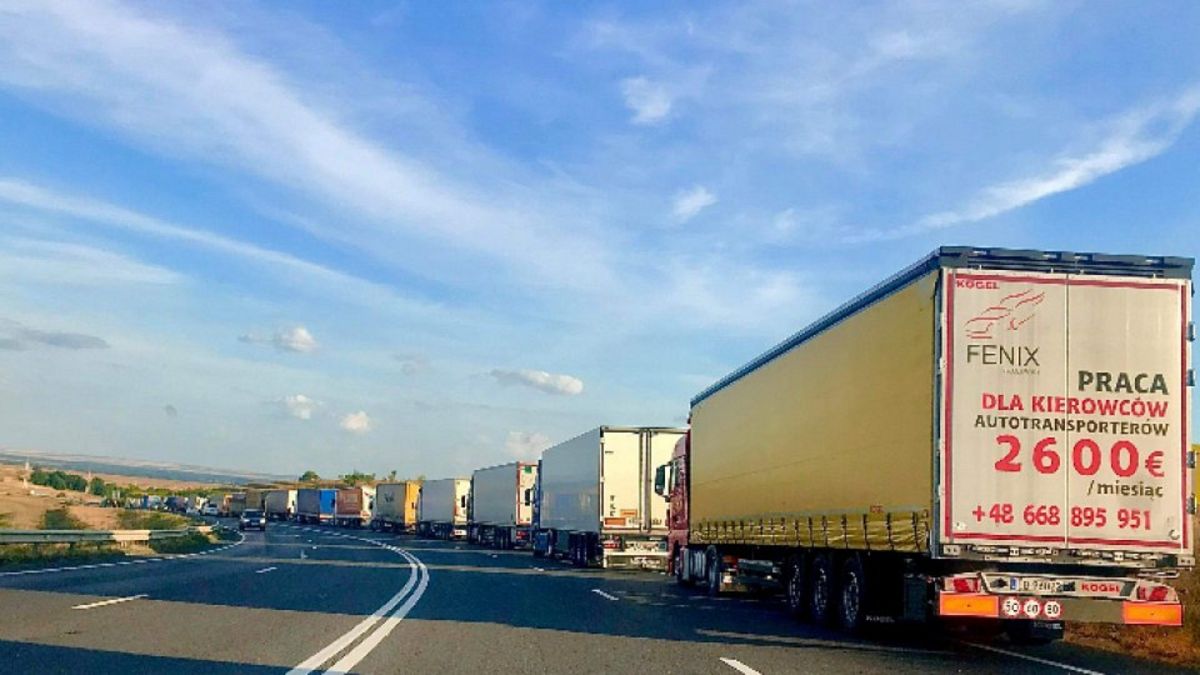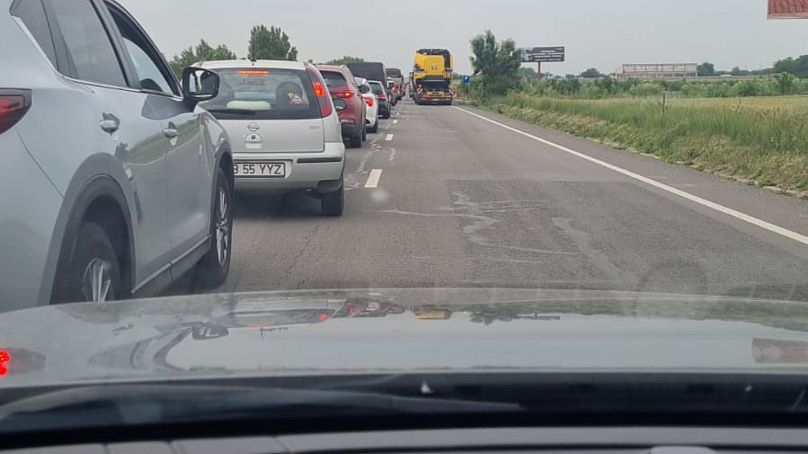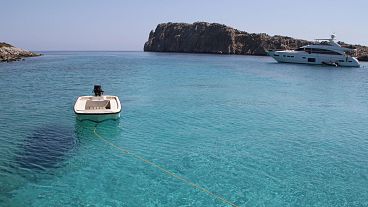Hours-long border queues are taking a climate toll in Bulgaria and Romania. Could entry into the Schengen Area help?
Pollution is on the rise as lorries queue for kilometres on both sides of the crossing between Romania and Bulgaria.
People in Giurgiu, a border town in southern Romania have for years felt that the air they breathe is no longer as clean as it used to be. It gets worse nearest to the checkpoint with Bulgaria where hundreds of lorries wait for hours to be inspected and allowed passage.
Romania and Bulgaria have been EU member states since 2007. Their campaign to become part of the Schengen Zone - an area that allows people and goods to travel freely between member countries without going through border controls - however, is ongoing.
Being admitted into Schengen would slash border waiting times, congestion and emissions from running engines.
For tourists going on vacation, long queues are an inconvenience. But for drivers of heavy duty vehicles that transit EU borders on a daily basis, the economic and health impact is huge.
Slow-moving traffic makes air ‘unbearable’ at Bulgaria and Romania’s borders
“The seven kilometre bypass stretching from Giurgiu in Romania to the border with Bulgaria is packed day and night with hundreds of lorries,” Bogdan Priceputu, born and raised in Giurgiu, tells Euronews Green.
“Not only is the air dirtiest in that vicinity but the field nearby gets littered with garbage as drivers wait by the side of the road for hours, without amenities and sanitation facilities, to cross the border into Bulgaria.”
Until recently, Bogdan’s father worked as a customs officer on the Romanian side of the border. “I know that several times a day the air got unbearable due to the slow moving traffic,” he says.
Things are not much better on the Bulgarian side of the border. For years the border town of Ruse has been trying to curb its air pollution problem but to no avail. People have taken to the streets to protest against the issue and it has even become a topic of debate in the European Parliament.
The river Danube acts as the border between Romania and Bulgaria. Bogdan explains that when he gets on his boat and goes out on the river he can sometimes see smog plumes gliding across the nearby canal. “I don’t know if it’s from the traffic, but the increasing number of lorries waiting nearby at the border sure doesn’t help.”
Lorry drivers don’t have it any easier.
“A couple of weeks ago I ended up waiting for over 24 hours to cross the border from Bulgaria into Romania,” a Romanian lorry driver tells Euronews Green. “Of course it was unbearable, of course there’s pollution. I am driving a chiller lorry and the engine needs to be running almost all of the time otherwise the shipment goes bad.”
What are the health risks of traffic pollution in Bulgaria and Romania?
According to Eurostat southeastern Europe has some of the EU's most polluted cities. Bulgaria and Romania have the first and third highest values of fine particulate matter - also known as PM2.5 - in the entire European Union.
This is only set to worsen as winter descends: studies show levels of the larger PM 10 rise as temperatures drop in Bulgaria, fuelled by transport, industry and domestic heating.
Pollutants such as particulate matter suspended in the air are particularly worrisome as they reduce people’s life expectancy, aggravating many chronic and acute respiratory and cardiovascular diseases, according to the European Environment Agency.
Excess traffic emissions put border communities at risk of pollution-related health problems.
“Air pollution is one of the leading causes for pulmonary cancer,” oncologist Roxana Macarie, tells Euronews Green. “It also increases the risk of breast, liver and pancreatic cancer in all age groups.”
Roxana practises medicine in Bucharest, Romania’s capital, but travels frequently to the border city of Giurgiu where some of her relatives live.
“Traffic has increased significantly over the past years. There are hundreds of lorries waiting each day around the city, some with their engines running, to cross into Bulgaria. That can’t be good for air quality in the area,” she says.
PM 2.5 can also have long-term impacts on children’s lung function and development. This can lead to respiratory and cardiovascular diseases, including asthma, which affects nine per cent of young people in Europe.
The environmental toll of keeping Romania and Bulgaria outside the Schengen area is adding up.
What’s keeping Bulgaria and Romania out of the Schengen area?
Both Bulgaria and Romania met the necessary criteria to join the passport-free zone over a decade ago.
They have received backing from the European Commission and the European Parliament. But the final green light has to come from the Council of the European Union.
They need approval from all 27 EU countries but still face opposition from Austria and the Netherlands.
Austria’s resistance stems from a broader dissatisfaction with Schengen and flows of migrants that cross into the EU. The Netherlands has signalled it might approve Bulgaria's bid if a series of conditions on judicial reform and anti-corruption fight is met.
A new vote is slated to be held next month.
What is the environmental impact of border crossing delays?
In a statement calling for Bulgaria and Romania’s Schengen ascension by the end of 2023, the European Parliament highlights the environmental and health burden of delaying the decision.
MEPs say that queues faced at two countries’ border crossings can last from a few hours to even days. This translates into 46,000 tonnes of CO2 emitted each year, according to recent analysis by accounting organisation KPMG.
The added pollution inflicts “irreparable damages” on the environment and will have health repercussions for drivers, customs agents and people living near border crossings, the statement continues.
The European Parliament believes that limiting border crossings and obstructing the free flow of goods between EU member states do not align with the bloc’s climate neutrality goal, which aims for net-zero greenhouse gas emissions by 2050.
Already, the years of delays have led to half a million tonnes of excess CO2 emissions, according to KPMG. This is the equivalent of over 600 GWh of electricity produced from climate-wrecking coal sources, or enough to power 60,000 homes for a year.




